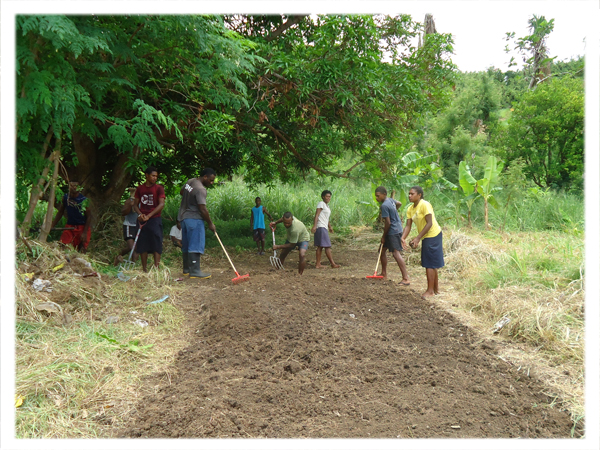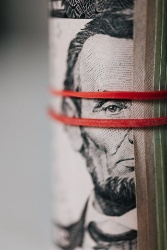Food security projects for remote island communities
Food security projects give remote island communities long-term disaster resilience
26 March 2015 (Fiji) Remote island communities in Fiji’s Yasawa Islands will be better prepared to have food supplies in times of disaster, even if their crops are destroyed.
A new Food Bank project will help villages have a ready supply of food and water, with risk-resilient crops and farming techniques being introduced to help the communities become more resilient to climate change and disasters.

This initiative is the result of a partnership with Vinaka Fiji and Commissioner Western’s Office, with support from the Pacific Risk Resilience Programme (PRRP) and its implementing partner Live and Learn Environmental Education (LLEE). PRRP will also support Fiji’s Department of Agriculture to provide agriculture training on resilient crops and food storage, including traditional knowledge approaches.
Seven villages in the Yasawas will be targeted over 2015 for the Food Bank initiative, explained PRRP Local Coordinator for Live and Learn, Lanieta Tokalauvere. This will include crop planting and storage so there is food during a disaster period, plus raising funds for post-disaster recovery.
“The Food Bank starts in Soso and Kese villages of Naviti Island, with committees and ‘Knowledge Hubs’ already in place,” Mrs Tokalauvere said.
“Community members are now clearing the land to prepare it for planting.”
“Knowledge Hubs comprise local volunteers committed to helping people share information and expertise, so residents can be trained and empowered across a range of topics including planting and crop selection, building, and financial management,” she said.
PRRP has assisted Vinaka Fiji in forming the Food Bank, according to Elanoa Vakabunoya Nimacere, Operations Manager for Vinaka Fiji, which is the volunteer programme for South Sea Cruises.
Vinaka Fiji coordinates a volunteer programme to provide basic needs such as fresh water, nutrition, power supply and education to 15 remote communities in the Yasawa Islands.
“Vinaka Fiji is involved in many partnerships with government, with the likes of PRRP, the community and NGOs as we all have a common goal: to assist local communities,” Ms Nimacere said.
“We encourage partnerships like this between the public and private sectors, that look at all aspects of food security and even financial planning, to help people make informed decisions about the Food Bank and all the ways it can help them prepare for a disaster.”
“At the end of the year, when the planting is done, and if there have been no disasters, the money can be banked and stored as an Emergency Fund for use during any future disasters.”
Planning ahead for such potential climate change and disaster related-risks is central to the work of the PRRP, which focuses on how communities, governments, and the private sector can all work together to help build resilience, by embedding risk into planning processes across all levels of governance.
“It’s a real honour for PRRP to partner with Vinaka Fiji, and its private sector partners, given the great work they’ve been doing recently in partnership with the Government in the Yasawa Islands,” says Programme Manager for PRRP, Moortaza Jiwanji.
“The Pacific Risk Resilience Programme aims to strengthen the resilience of Pacific island communities to disasters and climate change related risks. So it makes sense for us to work remotely in the Yasawa Islands, with people who are typically hardest hit by disasters and climate change,” says Mr Jiwanji.
Mr Jiwanji explains PRRP is about more than just helping communities in the short term.
“Food Banks, Knowledge Hubs, financial planning, agricultural training and other aspects of this partnership are very effective initiatives to help Fijian communities become more prepared for the impact of natural disasters and climate change,” he said.
“But there also needs to be a strong planning and governance structure in place to make sure these strategies will be sustainable. Climate change and disaster risk reduction impacts all development in the Pacific, ranging from economics to infrastructure, and so it influences almost every decision made by community, government, local agency or private sector operators,” Mr Jiwanji says.
PRRP works with Pacific Island nations and their people to think about the risks they may face from climate change and disasters when they are making their usual plans for development. Communities can become more resilient to climate change and disasters if routine government, community and other planning takes these risks into account. This risk governance approach is implemented by the United Nations Development Programme (UNDP) and international non-governmental organization Live and Learn Environmental Education (LLEE) and supported by the Australian Government’s Department of Foreign Affairs and Trade (DFAT). PRRP is being delivered in four countries: Fiji, Solomon Islands, Tonga and Vanuatu.
ENDS


 UNICEF Aotearoa NZ: Aid Cuts Threaten Fragile Progress In Ending Maternal Deaths, UN Agencies Warn
UNICEF Aotearoa NZ: Aid Cuts Threaten Fragile Progress In Ending Maternal Deaths, UN Agencies Warn Médecins Sans Frontières: Concern Over Planned Deportation Of Afghan Refugees In Pakistan
Médecins Sans Frontières: Concern Over Planned Deportation Of Afghan Refugees In Pakistan European Cultural Centre: Time Space Existence 2025 - A Collective Call To Repair, Regenerate, And Reuse
European Cultural Centre: Time Space Existence 2025 - A Collective Call To Repair, Regenerate, And Reuse John P. Ruehl, IMI: What Will Tech Moguls Do With Their Wealth?
John P. Ruehl, IMI: What Will Tech Moguls Do With Their Wealth? ITUC: Workers Must Not Pay The Price Of An Imposed Trade War
ITUC: Workers Must Not Pay The Price Of An Imposed Trade War Greenpeace: Major Deep Sea Mining Company Goes Bankrupt
Greenpeace: Major Deep Sea Mining Company Goes Bankrupt